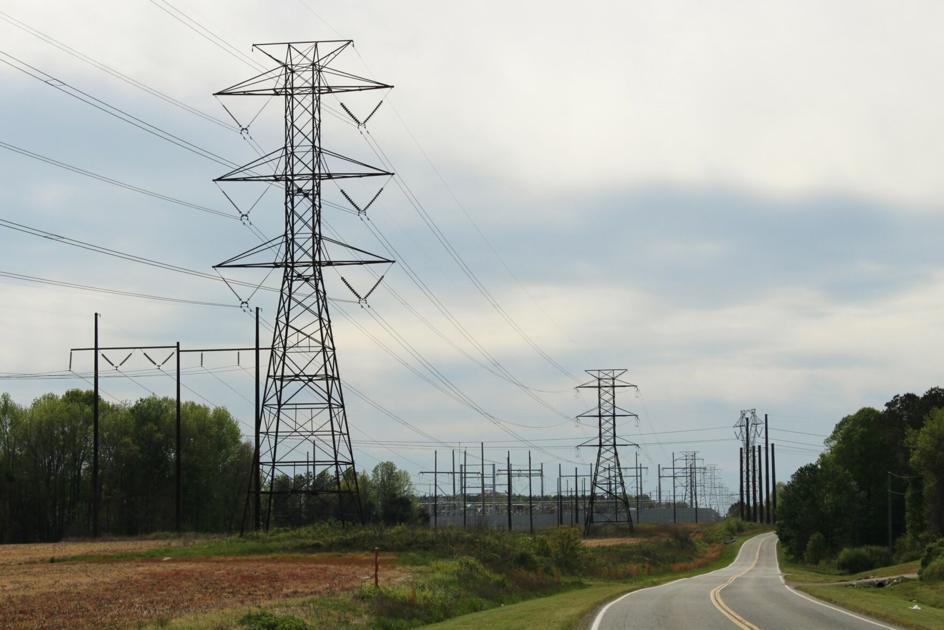
“Virginia policymakers have decided to make our electricity supply greener, and to do that we have to build a substantial amount of energy sources over the next few years. … If we’re going to do that, we have to be prepared, and we have to bring all the information together to allow us to do that in a cost-effective way,” said William Shobe, director of the initiative within UVA’s Weldon Cooper Center and the author of the report.
Overall, Shobe predicts that Virginia’s electricity sales will increase 30 to 38% by 2035 and by more than 78% by 2050, compared to current sales. Some experts, however, caution that many variables will affect future electric demand.
In Shobe’s analysis, nearly all of those increases will be due to two factors: data centers and transportation electrification.
Over roughly the past decade, commercial and industrial electricity demand have been falling in Virginia, while residential sales have flattened or in some cases declined. Appalachian Power sales, the report says, “have, in recent years, settled into a slow decline due to efficiency improvements as well as declining population and industrial activity in its service region in Southwest Virginia.”
Appalachian Power spokesperson Teresa Hall said the company “does not expect a sharp turnaround in the load growth trend in its Virginia service territory.”
“We continue to work diligently with our local, regional and state economic developers on ways to attract new business and industry to help these areas rebound and grow,” she said.
Even as sales to these sectors decline or plateau, data centers, which have proliferated in Virginia in recent years, are not only offsetting the losses but far exceeding them.
In 2016 Northern Virginia became the world’s largest data center market in the world, leading Loudoun County to brand itself “Data Center Alley.” By 2019, Northern Virginia’s market had swelled to such an extent that it was nearly as large as the next four largest U.S. markets of Dallas-Fort Worth, Silicon Valley, Chicago and Phoenix combined, according to a report prepared for the Northern Virginia Technology Council.
“Data center electricity use has been accelerating and is on a trajectory to rival all other commercial electricity sales in the state by 2030,” the Weldon Cooper forecast finds. These sales will be “the only significant current source of growth in electricity demand and will continue to be so until such time as electric vehicle sales increase substantially.”
How closely the predictions match reality will depend on whether data center growth continues at its current frantic pace.
“We do not expect that this rapid acceleration can continue indefinitely,” the report says. Nevertheless, “the range of applications of data services will probably continue to increase with the expansion of mobile communications and data services, industrial controls, crypto-currency mining, gaming, internet-aware appliances and many other applications.”
Even considering several possible scenarios for data center growth — high, medium and low growth — the forecast finds that sales to this sector are still likely to increase significantly. By 2030, Shobe predicts that if only moderate growth occurs, Dominion Energy’s data center sales will still outstrip all of its other commercial sales combined.
Conversion from internal combustion engine cars to electric vehicles will also drive up electricity demand, the report found. During the 2021 General Assembly session, lawmakers agreed to adopt a zero-emission vehicle standard that requires a certain number of vehicles manufacturers sell within the state to be electric. President Joseph Biden’s administration has also announced major commitments to electric vehicles, and several major automakers including General Motors have announced pledges to go all-electric over the next two decades.
However, in Virginia, the Weldon Cooper report cautions, “the pace of this transition is highly uncertain. … The current fleet of EVs is currently too small to have any measurable effect on electricity sales. So we cannot use the history of past sales as a helpful guide to future sales.”
Will Cleveland, an attorney with the Southern Environmental Law Center who works closely on Virginia energy issues, called it “noticeable … that Shobe seems to be saying what we have been saying for years: the only growth sector at all is in data centers.”
However, Cleveland said that in testimony before the State Corporation Commission, SELC has “been pretty critical of simply applying formulas to past growth because the data center industry is much more complicated than that.”
“By 2050 we have no idea what the options are going to be for behind-the-meter generation and storage. We have no idea how efficient the data centers are going to become or whether they’re going to start to operate with their own on-site solar,” he said.
Shobe said that while the forecast “helps us figure out the best path forward,” it also highlights the need for more detailed information about what Virginia electricity providers should plan for in coming decades, particularly as they decarbonize their generation fleets in response to the Virginia Clean Economy Act.
“I think there’s a real need for us to do more and know more and to try to tighten this forecast up at least as far as data centers are concerned,” he said.
David Murray, executive director of the Chesapeake Solar and Storage Association, a trade group that advocates for clean energy in Virginia, Maryland and Washington, D.C., said the report highlights the role the burgeoning industry can play as Virginia’s transition away from fossil fuels continues.
“We’re certainly well equipped to meet the growth in electricity demand with solar power, wind power and other local resources and at the same time get more efficient,” he said.
"electric" - Google News
May 06, 2021 at 04:29AM
https://ift.tt/3b1F6M7
Data centers and electric vehicles will drive up Virginia electricity demand, UVA forecaster predicts - Fauquier Times
"electric" - Google News
https://ift.tt/2yk35WT
https://ift.tt/3bbj3jq
No comments:
Post a Comment